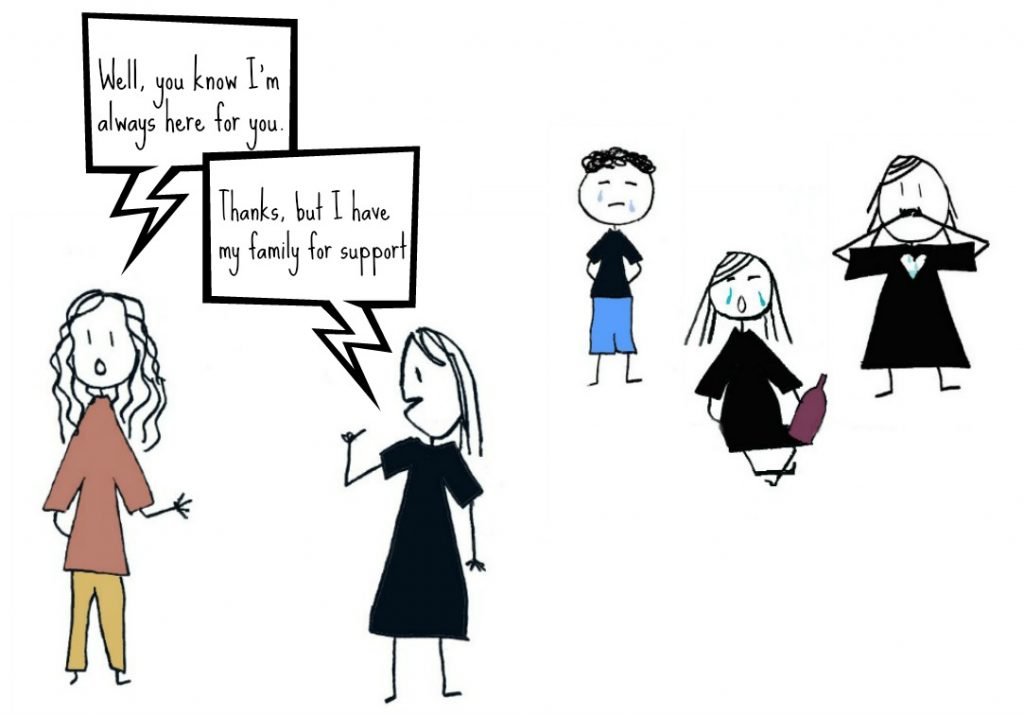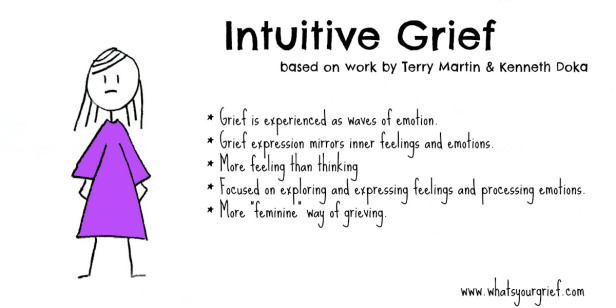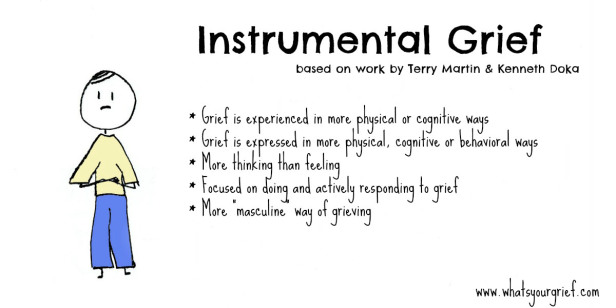Will I See My Family Again
Ahhhh, family unit.
Family, family, family.
Family can exist great, only that'south not what this mail service is most. This mail service is about decease and grief and all those times you've looked at a family member and said – "who are yous?" "what are y'all doing? " "where were you lot?" "when did you turn into someone I don't know?" "why aren't you there for me?"and "how tin can I count on you?"
After a death, many people feel isolated and misunderstood. Dejected by friends, co-workers, and community they may say – well at least I take my family. And why shouldn't they?Family is supposed to be at that place for each other. For many, their family unit has always been the weight that keeps them grounded and their buoy in the storm.
Here's the problem, expiry and grief tin make people act kind of crazy and information technology can seriously rock a family unit'southward center of balance. If the death happened within the family, and so there is fertile ground for family misunderstanding every bit family members attempt and deal with changing roles and dynamics, dissimilar grieving styles, and complicated emotions.
Now, some people are lucky to discover their family is exactly as supportive and caring as expected, but it is very common for people to turn to their family unit and detect themselves terribly disappointed and confused. We receive a lot of questions about why this might happen, and due to complicated family dynamics, it's a question we can rarely answer. Still, we have a few general hypotheses about why family misunderstanding might occur after a death, which we're going to hash out today. In reality, your situation is likely a combination of factors; our hope for this post is to just become you thinking.

Irresolute Family unit Dynamics:
We just beloved talking almost theories around here, so allow's start with 1. Family systems theory was introduced by Dr. Murray Bowen in the 1960s. Very basically, the family systems theory says that families are systems of interconnected and interdependent individuals. Within the family unit organization, each member has a role to play and members of the system are expected to respond to each other co-ordinate to their part and relationship. Maintaining the aforementioned design of behaviors inside a organisation may lead to balance inside the family system (but also to dysfunction).
When someone dies, the whole family unit system is thrown off. Grieving family unit members find themselves disinterested and/or incapable of behaving in the ways they used to. Not only practice people have to cope with grief, simply they likewise must deal with the fact that a vital piece of the family unit is gone. Some of the roles your loved one used to inhabit will have to be filled past family members and, every bit everyone adjusts, a seismic shift in the way things 'have always been' tin can occur.
Different emotions:
Grief can make you feel similar you are going crazy. Your response to grief volition exist entirely different than anyone else's and so will the range of feelings you lot feel in response to the loss. Here is a partial list of emotions typically associated with grief:
daze, numbness, sadness, despair, loneliness, isolation, difficulty concentrating, forgetfulness, irritability, anger, increased or decreased appetite, fatigue or sleeplessness, guilt, regret, depression, anxiety, crying, headaches, weakness, aches, pains, yearning, worry, frustration, detachment, isolation, questioning religion.
Quite frequently, family members will answer differently to the same death. When each person is going through their own individual emotional feel, it can be difficult to figure out how to connect with and back up one another. When someone yous love is all of a sudden angry, depressed or anxious, or numb, your firsthand reaction might be to wish they would snap out of it. Conversely, if y'all are the one feeling these emotions, you might feel more distant and isolated from your family. In a perfect world, people would take patience and understanding for one another, simply sometimes this is easier said than done.
Birth order:
Although research on birth social club is often contested, I think nosotros can all agree that position in the family unit has some impact on who nosotros are every bit people, how we behave in the family unit, and the expectations nosotros accept for other family members. If y'all accept a smaller family unit, it's far more likely that you will take a prototypical 'oldest', 'middle' or 'youngest'.
It may be that after a death the oldest child feels they have to step in and take care of grieving parents and younger siblings. If it is a parent who died, perhaps the oldest child feels compelled to make full some of their roles. Perhaps the youngest child has been babied so they feel they demand a trivial extra emotional support. Regardless, some family members may end up feeling unsupported or forced to footstep into shoes they feel they cannot or do not want to fill.
This whole dynamic becomes a little more complicated in larger families. But, when there is a large gap in age between the oldest and youngest, I retrieve information technology's interesting to consider the idea that the family the oldest child grew upwardly with is oft quite unlike than the family unit the youngest kid grew up with. This might explain some differences in relationships and in outlook afterwards a decease.
Gender/Grieving Fashion:
To be perfectly honest, this heading is a bit misleading. It is not a fact that men and women have entirely different and singled-out grieving styles. Rather, prominent grief researchers Kenneth Doka, and Terry Martin believe that there are different grieving styles that are associated with existence characteristically "masculine" or "feminine".These grieving styles exist on a continuum and gender is merelycontributes to the fashion you grieve.For an in depth discussion on their theory, head here.
Briefly, this theory asserts that there are two types of grievers – instrumental and intuitive.

Intuitive grief is experienced mainly in terms of feelings and emotions – "I felt sad" or "I felt aroused" – and the grief response is usually focused on exploring and expressing these emotions – "I cried all night" or "I got then mad I couldn't think."

Instrumental grief is experienced in more physical and cognitive means – "I couldn't cease thinking virtually what happened" or "I felt like I couldn't breathe." The instrumental grief response is expressed in concrete, cerebral or behavioral ways and looks more like 'doing' or 'taking action'.
Now, you tin can imagine how misunderstanding would arise when intuitive and instrumental grievers exist in the same family. The instrumental griever, who appears less emotional and more active, might seem cold and uncaring to an intuitive griever who believes that emotions are the expression of grief.
Coping Style:
I'k not going to get too in depth on this topic because nosotros've written about information technology quite a lot. Basically, you lot should never assume that someone will grieve in the aforementioned style every bit you considering we all have different coping styles. The WYG philosophy on coping is that each of us has predispositions toward the rational, the creative, or the emotional sides of our minds. Though nosotros all certainly have a scrap of each of these within the states, we often lean toward i style over another. To hear more about this, listen to our below podcast on the topic.
Age:
Age and stage of life apparently has a large touch on beliefs and how ones makes sense of their world and experiences. We've written about the influence of age on child and adolescent understanding; special considerations for grieving teens; and grieving as a 20-something. The about important take abroad is the idea that a person's life context has an influence on how they perceive their experiences. Things like access to support, past experiences, resources, physical wellness, existential angst all have an impact on grief and also change with age. So in attempting to sympathise another person, information technology is by and large helpful to take their stage of life into context.
Secondary Stressors:
Society's notion that grief is something that tin be 'dealt with' inside months to a year after a loss seems ridiculous to many. I think this notion assumes that people have all the time, space, and support in the world to deal with their hardship. When in reality people have to deal with all sorts of extra stressors like work, schoolhouse, childcare, etc on summit of their grief. Sometimes people have to prioritize and make choices about the things they will give their time and attention to which might mean…
- Giving less fourth dimension and attending to the things theyusedto care about
- Having less energy to back up other people
- Choosing not to focus on themselves and their grief
- Opting out of time with family and friends
- Becoming overwhelmed
It can be like shooting fish in a barrel to lose patience with someone when you remember they are letting you down or handling things poorly, only before passing judgment you should consider all the many things they take on their plate.
They're in a different place:
Although people would have you believe in that location is a timeline associated with grief, there really isn't. So information technology should almost be expected that people grieving the same loss will be at dissimilar places in their grief at different times. You may be prepare to talk openly nearly your loved ones decease, while the rest of your family still prefers to avert the topic. Your sibling might feel capable of sorting through your loved one's property, while yous nevertheless can't imagine the thought of it. These differences tin can hands result in misunderstanding and confusion, and then communication and patience are key. Although some family members may never want to grieve in the same mode you lot practice, many times people just need time to observe their ain peace and perspective.
Avoidance and negative coping:
Avoidance is i of my favorite topics because I think it explains and so much of what nosotros do. Nosotros wrote a very comprehensive post on this topic which I encourage yous to read. When we talk about abstention in grief nosotros are usually referring to experiential avoidance.
Experiential avoidance is an endeavour to block out, reduce or change unpleasant thoughts, emotions or bodily sensations. These are internal experiences that areperceivedto be painful or threatening and might include fears of losing control, being embarrassed, or physical damage and thoughts and feelings including shame, guilt, hopelessness, meaninglessness, separation, isolation, etc. Now please notation I say "perceive to exist painful or threatening," these perceptions are ofttimes subjective and what is perceived equally threatening to one may seem totally irrational to another.
One might avoid in grief because they don't like to experience painful feelings. The onset of a grief wave is sometimes predictable but often not and each new wave brings with it an sea of unpleasant thoughts, reminders, sensations, and memories.
Many are experiencing emotions of this type and intensity for the first time and in response, they may showroom physical, behavioral and emotional reactions they aren't comfortable with. This may exist peculiarly truthful for those who accept yet to develop a reliable set of coping skills. Although grief is ever unpleasant and uncomfortable, for some there are aspects that actually seem threatening and these perceptions tin lead to attempts to control or avoid frightening feelings and reactions.
And then, when your husband is putting away your deceased son's property style before you're ready, it might be in an effort to avert reminders. When your siblings turn down to talk with you about your deceased father, it might be in an effort to avoid the memories. In grief, avoidance is ofttimes perceived every bit a lack of caring when in authenticity it comes from intense caring.
Avoidance is at the heart of most negative coping. Negative coping consists of things like substance use, staying busy, and isolation; basically anything you can do to numb, forget, and minimize your exposure to grief triggers. To larn more about negative coping you tin can listen to our podcast on the continuum of negative coping:
Now that y'all understand the 'why', if your family unit is fighting in the wake of a death go here for some helpful tips on handling the situation.
Subscribe to What'southward Your Grief to receive posts straight to your inbox.
Source: https://whatsyourgrief.com/family-misunderstanding/
0 Response to "Will I See My Family Again"
Post a Comment